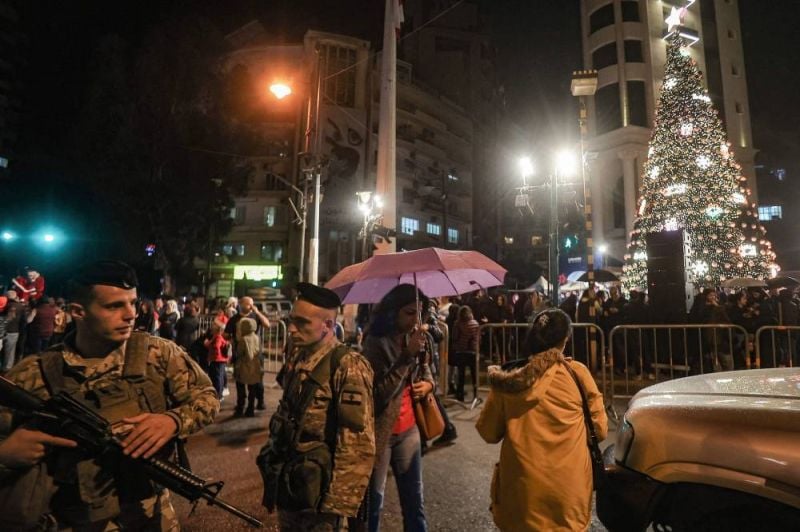
Security forces stand guard during the lighting of the Christmas tree in Sassine Square in the Achrafieh district of Lebanon's capital Beirut on Dec. 7, 2022. (Credit: Anwar Amro/AFP)
Want to get the Morning Brief by email? Click here to sign up.
Parliament is scheduled to convene today for a ninth attempt to elect a president. The country’s dual executive vacuum — in effect since Nov. 1 — continues to fuel disagreements on the functioning of state institutions. Previous electoral sessions consistently resulted in Zgharta MP Michel Moawad as the sole contender against a majority of spoiled or blank votes — chiefly blank ballots cast by Hezbollah, the Free Patriotic Movement (FPM) and their allies. However, FPM head Gebran Bassil on Tuesday hinted that his party might no longer cast blank votes after a disagreement with Hezbollah over a controversial cabinet meeting. Caretaker Prime Minister Najib Mikati justified the Monday cabinet meeting — which was boycotted by seven of 24 ministers — by citing Parliament’s prior approval and the urgency of matters discussed, including the approval of funding for the army and for state-insured patients’ treatments. Ahead of today’s session, the Tashnag parliamentary bloc expelled caretaker Industry Minister MP George Bouchikian for participating in the cabinet meeting. Meanwhile, Parliament Speaker Nabih Berri indefinitely postponed a parliamentary session scheduled for yesterday and aimed at addressing the issue of corruption in the telecoms sector after a number of MPs announced a boycott, refusing to attend any non-electoral parliamentary sessions amid the vacuum.
Lebanon's recent cholera outbreak "is under control," caretaker Health Minister Firass Abiad said yesterday, while the Litani River Authority (LRA) announced that cholera was detected in 40 percent of water samples collected from different areas along the riverbed. Abiad added that the cholera vaccine was administered to 500,000 people of the 600,000 targeted by the vaccination campaign launched last month. Lebanon has recorded 655 confirmed cholera cases and 23 deaths to date. “The main areas targeted in the [second phase of the] vaccination campaign will be Tripoli, Dinnieh, the remaining villages of Akkar (all located in northern Lebanon), Baalbeck (Bekaa Valley) and localities along the Litani River,” Abiad continued, setting an inoculation goal 1.5 times higher than the previous round of dosing. The same day, the LRA announced the presence of cholera in four out of 10 samples collected in the Bekaa from a source in Chtaura; in the river of Berdawni in Zahleh; and in Marj, near a camp of Syrian refugees. The LRA linked the contamination to “the discharge of untreated wastewater,” highlighting that the disease was present in areas "downstream from camps for displaced Syrians, sewage outlets or hospitals.”
State electricity utility Electricité du Liban employees scheduled a sit-in for today, launching an open-ended strike over wage grievances. The EDL employees’ union announced their work stoppage excludes functions that would pose “a danger to public safety,” listing improved wages and their payment in cash in their demands. EDL employees held a prolonged strike earlier this year, demanding higher salaries and health insurance coverage, and criticizing perceived violations by EDL authorities linked to private electricity service suppliers. State-owned mobile telecom operators Alfa and Touch employees also launched an open-ended strike earlier this week to demand improved compensation and to oppose reported corruption.
“Seventy percent of foodstuffs” will not undergo a customs tariff increase, caretaker Economy Minister Amin Salam said, announcing that a World Bank loan to finance wheat imports will come into effect by the end of the month. Salam added that the ministry will issue a list of products affected by, or exempted from, the customs tax and the imported products tax. A tenfold increase to the lira-to-dollar exchange rate used to calculate customs taxes sparked fears of a drastic hike in consumer prices, already heavily affected by inflation. Bread bundle and wheat prices, however, will remain stable for a year, Salam said, enabled by the implementation of a $150 million World Bank loan approved by Parliament in October. Over the summer, the country experienced interruptions in flour deliveries from the mills to the bakeries, which led to extreme bread shortages and sparked some panic among consumers.
Security forces have arrested 185 people suspected of collaborating with Israel over the past three years, up from a previous average of four to five arrests per year on spying charges, the news agency Agence France-Presse (AFP) yesterday cited two security sources as saying. “This is the first time that so many people have been arrested on charges of collaborating with Israel, and it's because of the crisis,” a security source reportedly told AFP. According to the AFP report, except for three suspects, all those arrested on suspicions of spying allegedly began collaborating with Israel in the past three years. In a May speech, Hezbollah leader Hassan Nasrallah claimed “Israel is in a rush to recruit spies and is doing so unprofessionally” after caretaker Interior Minister Bassam Mawlawi announced the dismantling of 17 Israeli spy networks. After the May counterintelligence crackdown, which led to 21 arrests, AFP quoted a judicial source saying Israeli spy handlers exploited the suspected collaborators’ “difficult living and social conditions, which made it easier to recruit them.” Between April 2009 and 2014, Lebanese authorities detained more than 100 people accused of spying for Israel, most of them members of the military or telecoms employees, before the rate of arrests declined for several years.
In case you missed it, here's our must-read story from yesterday: “A people’s history of 1960s Beirut? Zeina Maasri illuminates a different ‘golden age’”
Compiled by Abbas Mahfouz